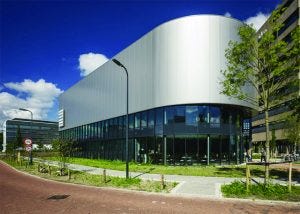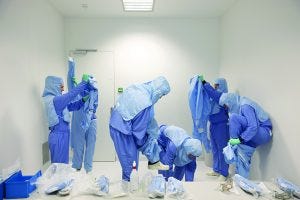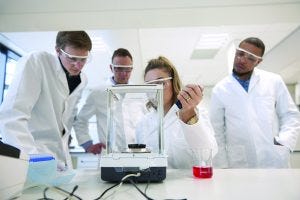Hands-On Training for Biopharmaceutical Careers: Trainees Gain Practical Experience in Realistic Production EnvironmentsHands-On Training for Biopharmaceutical Careers: Trainees Gain Practical Experience in Realistic Production Environments

The BIotech Training Facility in the Leiden Bioscience Park, the Netherlands (PHOTO COURTESY OF THE BIOTECH TRAINING FACILITY)
At the April meeting of the BPI International Summit (25−26 April 2017) delegates were treated to a tour of a new training facility. The Biotech Training Facility is about a 20-minute drive from the Amsterdam airport and located in the Leiden Bioscience Park. The park houses companies that employ ~18,000 life science workers. In addition, the Leiden University and the Leiden Academic Medical Center complement the dynamic high-tech environment that facilitates establishment of such a knowledge and experience center as this facility. The Biotech Training Facility opened its doors in February of 2016 and already has established itself as a source for training a new and continuing biopharmaceutical workforce.
I had the pleasure of speaking with Ronald Kompier, managing director of the facility. He brings experiences from 30 years in the life sciences in diverse activities involving research and development, manufacturing, clinical development and regulatory affairs for biologicals, and (in particular) vaccines.
I asked him to begin by introducing the Biotech Training Facility and its progress to date.
Building Skills in the Life Sciences Sector
Kompier: Many things come together in our facility. We became active in February 2016 primarily through public funding and some bank loans, so we are fully independent financially from industrial influence. We provide training under conditions of confidentiality and provide services without commercial conflicts to government agencies.
The purpose of the facility is to simulate a full manufacturing facility by providing the types of laboratories normally used for production and testing of biologicals, pharmaceuticals (e.g., antibodies, proteins, and vaccines), and medical devices. We offer three large laboratories. In addition, our 2.500 m2 of floor surface includes 800 m2 for cleanrooms and of course includes provision for utilities, clean water, water for injection, clean steam, and so on.
BPI: How does your concept of industry training and preparedness factor into the facility’s design and purpose?
Kompier: Bioindustry training has traditionally occurred in classroom settings in a theoretical way, or people are trained on the job within an existing facility by learning from colleagues in real time. This is not such a good idea because you don’t want to increase the risk of contamination of your product in cleanrooms. Gaining practical experience in a real production environment is not an ideal situation.
We produce hands-on training in real processes but in a facility that isn’t used for production. With a setting dedicated to realistic hands-on training, people can make mistakes and learn from them. This is one of the main drivers for such a facility: To build a higher level of skills for people working in the life sciences sector.

PHOTO COURTESY OF THE BIOTECH TRAINING FACILITY
BPI: Who are your trainees, and how do you find instructors?
Kompier: Our trainees represent a wide range of interests, from operators, laboratory workers, quality personnel, regulatory affairs personnel, supervisors, researchers, engineers, maintenance personnel, commercial people, and so on. They come to us as both newbies and experienced professionals. We contribute to the university program, but we also provide annual training to big-pharma employees who need to be recertified every year. We also train and certify maintenance personnel for working in good manufacturing practice (GMP) environments applicable within the broader pharmaceutical industry.
We have eight people on staff at the facility, some of whom provide training. But because we are covering a wide range of topics, we have a flexible pool of 20−30 trainers hired for specific modules. All trainers and instructors have industry experience. They have backgrounds in manufacturing phases and oversight of quality functions (our training manager is a former qualified person). So all instructors have major qualifications in project management, manufacturing, regulatory affairs and/or GMPs.
BPI: This seems like a dynamic setup, allowing you to provide what you need, when you need it.
Kompier: We are quite flexible to provide tailor-made, custom training. We offer standard training modules on our website and are approached by companies that want custom-made training at the Biotech Training Facility or in part (or fully) at their own locations.
BPI: Do customers want training using their specific or proprietary equipment?
Kompier: Sometimes — and sometimes they bring their equipment into our facility. And they might even bring in one or more trainers of their own. So we can support any configuration.
In 2016 we served clients from 16 different countries — which shows the international potential for such a facility. We provide training to clients throughout and even outside of Europe. But we recognize that it is not easy for a company outside Europe to come to the Netherlands. So we are looking into the possibility of offering virtual hands-on training using a webcam. One of our trainers would walk around wearing a webcam and providing instructions interactively, allowing trainees to ask questions directly about manufacturing activities.
If, for example, someone is gowning, the other trainer could watch the process, and a trainee online could see and ask questions. This capability is being set up now. It will be a combination of our facility and new technology. Already we have seen a great interest in this type of training from companies in Asia.

PHOTO COURTESY OF THE BIOTECH TRAINING FACILITY
BPI: How do you handle instructions specific to different regulatory environments?
Kompier: Our experts want to help companies implement training anywhere in the world, and they offer expertise for all regulatory environments. Through a web portal, our trainers can take on a consultancy/support function for both new and established European companies and for people operating in different regulatory environments — such as in China, Australia, Japan, and the United States. I have been providing training for people in India, Korea, and China for production of a polio vaccine.
BPI: What other groups have sought out training in or from your facility?
Kompier: We provide training not only to companies, but also to hospitals, academic institutions, and governmental agencies (such as for training GMP inspectors and regulatory authorities).
Within hospitals there may be some conventional small-scale manufacturing capabilities, but we are working on training in new therapies such as autologous cell therapies. We can help hospital researchers and physicians develop and test those therapies and offer training in related procedures.
We seek to use the latest equipment for this training, such as closed bioreactors and automated systems. Through access to state-of-the-art equipment in our collaborations with vendors, we can manage such programs very well.
BPI: How do you evaluate progress and success?
Kompier: One way we might measure the success of training in gowning techniques, for example, would be to test a trainee’s gloves for contamination afterward. We create custom-made tests to confirm how well key requirements have been met. We also certify our training, and that certification is recognized by local and national authorities in the Netherlands. Our trainees have given us high ratings — 8+ on a 10-point scale —which also has contributed to our successful outreach in such a short time.
Key Elements and Objectives |
|---|
The Biotech Training Facility offers programs based on the following key elements and objectives: https://biotechtrainingfacility.com/en/about-biotech-training-facility |
Progress, Milestones
The Biotech Training Facility website provides a chronological view of the organization’s progress. The program’s collaborative approach to developing its curriculum is a key factor enabling it to establish an early foothold in industry training. The training facility opened its doors with an agreement already in place from a big international pharmaceutical company for a custom-made pharmaceutical manufacturing course and with another custom-program in the works with a UK-based company. In May 2016 the Biotech Training Facility partnered with Avans+ toward combining that group’s expertise in laboratory courses with our GMP laboratories and cleanrooms.
In September 2016, the company announced signing a deal with a German company to develop and present custom GMP and viral production (aseptic) techniques. In November of that year, the facility participated in the first meeting of the
Leiden Area Biotech Discussion Group, sponsored jointly by the Biotech Training Facility and CASSS. Also that month, the facility and Xendo launched a lean six sigma program focusing on instruction toward process improvements in GMP settings (laboratories, production, QA, and regulatory).
January 2017 saw the program expand training options for biotechnology engineers through collaboration with Endress+Hauser, which donated instrumentation produced to ASMA-BPE requirements and which are typical for validated biotechnology facilities. And beginning in October (as this report goes to press), inspectors of the Dutch Healthcare Inspectorate (IGZ) and assessors of the Medicines Evaluation Board (CBG) will be trained at the Biotech Training Facility in GMP and other biotechnology-related topics.
These and other milestones show that training in real-world biopharmaceutical operations is not only in high demand, but also that collaborative approaches to such training are building expertise for the 21st century bioindustry.
S. Anne Montgomery is cofounder and editor in chief of BioProcess International, [email protected]. Ronald Kompier is managing director of the Biotech Training Facility, Sylviusweg 70, 2333 Leiden, Netherlands; [email protected].
You May Also Like






